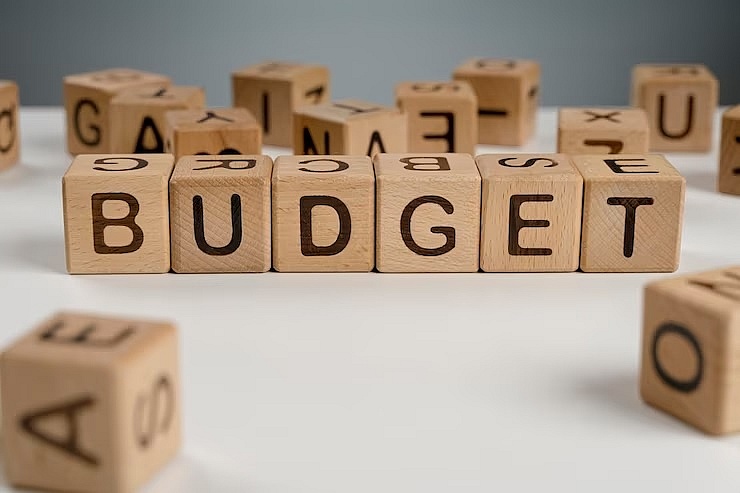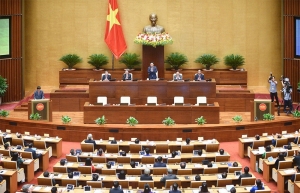Revenue rises remain tough despite budget surplus
 |
| Revenue rises remain tough despite budget surplus (illustration photo/ Source: freepik.com) |
The General Statistics Office (GSO) last week reported that in the first half of this year, the economy recorded a $2.97 billion surplus in the state budget. However, it said that such a surplus is not a positive signal for state coffers because of the dual reductions in both revenues and expenditure, in which the former has been bigger than the latter. “Enterprises and people are facing massive difficulties, so it is difficult to increase revenues, while the government has had to limit spending,” the GSO said.
Specifically, total state budget revenues are estimated to reach $36.49 billion, tantamount to 54 per cent of the year’s estimates and down 7.8 per cent on-year.
Domestic revenues are estimated to stand at $29.95 billion, down 4.7 per cent as compared to the corresponding period last year. What is more, revenues from crude oil exports sat at more than $1.27 billion, down 15 per cent on-year. Also, revenues from export-import activities are estimated to come at $5.26 billion, down 20.6 per cent on-year.
According to the General Department of Tax, state budget revenues from real estate, land, and securities plunged. For instance, in the first four months of this year, revenue from personal income tax (PIT) from property transfer was around 42 per cent of that in the same period last year, and PIT revenue from securities transfer dropped by half on-year. Revenues from housing and land registration fees plummeted 48.2 per cent on-year.
What is more, revenues from land use dropped strongly month-after-month. For example, such revenues hit an average $678.26 million a month in Q4 of 2022, while that of the first four months of this year reached of $347.82 million a month.
According to the GSO, in the first six months of this year, lower-than-collection expenditures have led to the above-said budget surplus. Total state budget expenditures are estimated to reach $33.52 billion – equivalent to 38.8 per cent of the year’s estimates and up 12.9 per cent on-year.
All types of spending kept an on-year expansion, such as recurrent spending ($22.39 billion – up 5.5 per cent); spending for development investment ($8.98 billion – up 43.3 per cent), and expenditure for interest payment ($2.12 billion – down 0.8 per cent). “All the expenditures have ensured requirements for socioeconomic development, national defence and security, state management, and payment for due debts,” the Ministry of Finance stated.
One of the biggest obstructions to increasing state budget expenditures is the slow-paced disbursement of public investment.
Figures from the Ministry of Planning and Investment showed that cumulative public investment disbursement for the first six months of this year reached 22.2 per cent of the prime minister’s approved allocation of VND707.4 trillion ($29.5 billion) for the fiscal year 2023, an increase of about 9 per cent compared to the same period in 2022. So far, nearly all of this huge sum has been allocated to disbursing ministries and provinces
“But public investment disbursement remains slow. There are so many causes, with the biggest are disconnected projects and cumbersome procedures which have yet to be decentralised, coupled with lax disciplines. This has led to slow disbursement with effectiveness not high,” said Prime Minister Pham Minh Chinh at a recent meeting with ministries and localities on the issue.
He required ministries, state agencies and localities to disburse at least VND675 trillion ($28.46 billion) in public investment, or 95 per cent of the goal, within this year.
The Asian Development Bank (ADB) proposed that effectively accelerating public investment will help Vietnam earn various positive results such as employment, larger engagement of private investment into the economy, and this will lead to enterprises’ bigger contributions to the state budget.
“It is critical to accelerate the disbursement of $29.5 billion in public investment. Along with the continued implementation of the stimulus programme endorsed in January 2022, this spending will generate substantial multiplier effects, creating strong motivation for the whole economy,” the ADB said. “In the long term, financial reform should continue, to reduce dependence on bank finance and enhance transparency in bond markets.”
Meanwhile, Prime Minister Pham Minh Chinh signed a directive on June 23 on revamping and strengthening the law on finance and the state budget.
According to the directive, audit and inspection activities have revealed that violations of regulations in the management of the state budget, public investment, public assets and debt, and pricing and pricing appraisal still occurs in many ministries, sectors, and localities.
What is more, the directive said that the implementation of a number of recommendations by audit and inspection agencies remains slow and there has been a lack of responsibility in handling and overcoming violations. The collection and reporting of handling results are still limited, not meeting the prescribed deadlines.
Under the directive, the government will strictly prohibit spending money from the wrong sources, and borrowing money from other budget sources without permission.
It also states that authorities at all levels are required to control budget expenditures strictly, complying with the law on the state budget. They must also perform the spending tasks stringently according to the assigned funding sources. In cases where there are no longer spending tasks, the state budget must be refunded under legal regulations.
 | Budget estimate shortcomings require modern fix The low-quality formulation of state budget revenue estimates needs to be improved, as it will continue having unwanted direct impacts on the country’s financial landscape. |
What the stars mean:
★ Poor ★ ★ Promising ★★★ Good ★★★★ Very good ★★★★★ Exceptional
Related Contents
Latest News
More News
- Private capital funds as cornerstone of IFC plans (February 20, 2026 | 14:38)
- Priorities for building credibility and momentum within Vietnamese IFCs (February 20, 2026 | 14:29)
- How Hong Kong can bridge critical financial centre gaps (February 20, 2026 | 14:22)
- All global experiences useful for Vietnam’s international financial hub (February 20, 2026 | 14:16)
- Raised ties reaffirm strategic trust (February 20, 2026 | 14:06)
- Sustained growth can translate into income gains (February 19, 2026 | 18:55)
- The vision to maintain a stable monetary policy (February 19, 2026 | 08:50)
- Banking sector faces data governance hurdles in AI transition (February 19, 2026 | 08:00)
- AI leading to shift in banking roles (February 18, 2026 | 19:54)
- Digital banking enters season of transformation (February 16, 2026 | 09:00)

 Tag:
Tag:




















 Mobile Version
Mobile Version